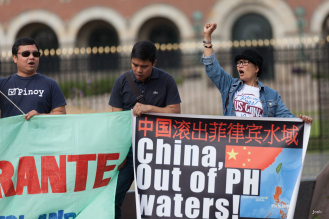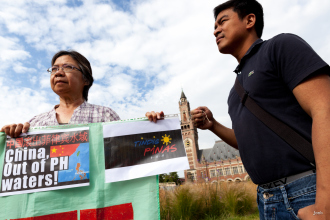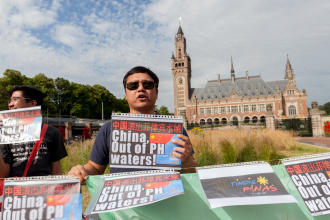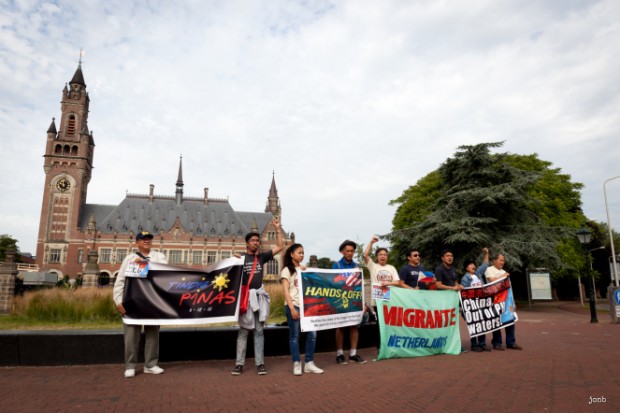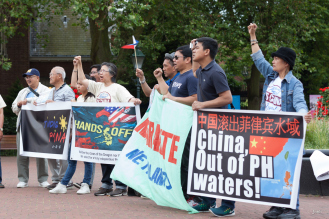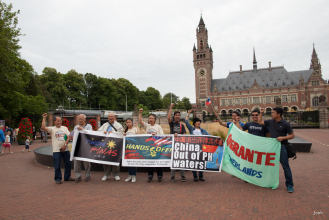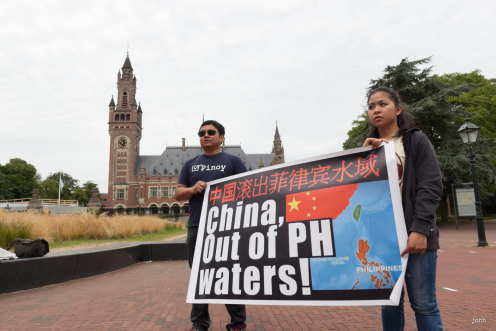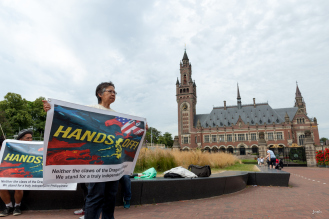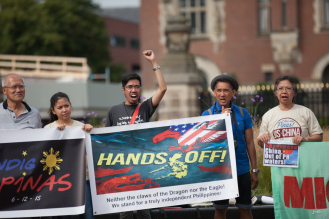Posts
Justice Antonio Carpio on the South China Sea dispute
/in News, Videos /by Kodao ProductionsHighlights of Supreme Court Senior Associate Justice Antonio T. Carpio’s presentation “The South China Sea Dispute” at the forum “Asserting Philippine Sovereignty in the Wake of the China-US Powerplay” organized by P1NAS (Pilipinong Nagkakaisa para sa Soberanya) held at the Pamantasan ng Lungsod ng Maynila on July 25, 2015. Justice Carpio gives an update on China’s reclamation of seven reefs in the Spratlys and debunks China’s 9-dashed line and illegal claims including that over Scarborough Shoal and the high seas. He presents solid historical facts, including old maps and documents, and sets legal bases for our arbitration case under the United Nations Convention on the Law of the Sea (UNCLOS) in the maritime dispute with China.
ITANONG MO KAY PROF: Podcast on China and US aggression in the Philippines
/in News, Radio, Videos /by Kodao ProductionsItanong mo kay Prof
June 9, 2015
Panayam ng Kodao Productions kay Prof. Jose Maria Sison, Chairperson, International League of People’s Struggle (ILPS) hinggil sa usapin ng panghihimasok ng mga bansang China at Amerika sa kalupaan ng Pilipinas. Si Prof. Sarah Raymundo ng Congress of Teachers and Educators for Nationalism and Democracy (CONTEND) ang pangunahing tagapagpadaloy at tagapagtanong.
Mga Tanong:
1. Ano po ang pahayag ng International League of People’s Struggle o ILPS hinggil sa mainit na usapin ng panghihimasok ng bansang Tsina at Amerika sa mga teritoryong saklaw ng pag-aari ng Pilipinas?
JMS: Maalab na makabayang pagbati sa iyo, Professor Raymundo.
Binabatikos at linalabanan ng International League of Peoples’ Struggle o ILPS ang panghihimasok ng Tsina sa West Philippine Sea, ang mga reklamasyon na ginagawa ng Tsina sa Kalayaan group of islands na malapit sa Palawan at ang pag-okupa ng Tsina sa Panatag Shoal o Bajo de Masinloc na malapit sa Zambales.
Binabatikos at linalabanan din ng ILPS ang rotational deployment ng US forces sa ilalim ng Visiting Forces Agreement at pagtatayo ng mga US military base sa ilalim ng Enhanced Defense Cooperation Agreement.
2. Matagal ng tumututol ang mamamayang Pilipino sa patuloy na panghihimasok ng US sa maraming usapin sa ating bansa. Subalit binibigyang depensa ng pamahalaan na ang mga kasunduang sinang-ayunan ng Pilipinas at US kagaya ng Visiting Forces Agreement (VFA) at Enhanced Defense Cooperation Agreement (EDCA) ay pagtiyak na walang agresyong magaganap mula sa labas ng bansa. Ano po ang inyong pagtingin sa bagay na ito? Talaga po bang maaasahan natin ang US ngayong ang Tsina ay patuloy na inaari ang ilang teritoryong pandagat ng Pilipinas?
JMS: Hindi maasahan ang US na ipagtanggol ang Pilipinas sa agresyon ng Tsina. Mas malaki ang interes ng US sa pakikipag-ugnayan sa Tsina kaysa sa Pilipinas. Mulat sapul alam ng US ang mga reclamation na ginagawa ng Tsina sa Kalayaan pero hindi tumutol ang US.
Ang mismong US ay matagal nang imperyalistang mapanghimasok sa Pilipinas. Matagal nang nauna sa Tsina sa agresyon sa Pilipinas. Kunwari tagapagtanggol ang US sa Pilipinas. Bantay salakay ang US. Gusto lang niya na ipataw ang mga interes sa Pilipinas. Lumilitaw na ang US at Tsina ay magkasabwat sa paghati at pagdomina sa Pilipinas.
3. Sa inyo pong pananaw, maipagwawagi ba ng mga progresibong grupo at mga tagapagtaguyod ng integridad at soberanya ng Pilipinas ang laban nito sa agresyong Tsina? Maaari ba kayong magbigay ng halimbawa ng isang maliit na bansa na lumaban at nagtagumpay sa panghihimasok ng malalaking bansa.
JMS: Malakas at makatarungan ang posisyon ng Pilipinas sa balangkas ng UN Convention on the Law of the Sea. Maliwanag na sa Pilipinas ang 12 nautical miles na territorial sea, 200 nautical miles na exclusive economic zone at 150 pang nautical miles na extended continental shelf. Dapat manalo ang inihapag ng Pilipinas na kaso laban sa Tsina sa International Tribunal on the Law of the Sea. Pero sinabi na ng Tsina na hindi susunod sa desisyon ng tribunal kung pabor sa Pilipinas.
Wala mang sapat na barko, eroplano at missile ang Pilipinas para labanan ang panghihimasok ng Tsina, puedeng magkaisa ang sambayanang Pilipino at puedeng inasyonalisa at wakasan ang mga empresa ng estado at mga korporasyon ng Tsina sa loob ng Pilipinas. Marami ring bansa ang susuporta sa makatarungang layunin ng sambayanang Pilipino.
4. Ano po ang inyong mensahe sa sambayanang Pilipino hinggil sa ating topic ngayon sa ating podcast?
JMS: Pinakaimportante ang pagkakaisa ng sambayanang Pilipino para ipagtanggol ang pambansang soberanya at integridad sa teritoryo. Mainam na itinayo ang kilusan ng mga Pilipinong nagkakaisa para sa pambansang soberanya.
Kapag malakas at matibay ang pagkakaisa, mapangyayari natin ang nasyonalisasyon ng mga empresa ng mga dayuhang kaaway at ang pagpapatupad ng pampulitika at ekonomikong soberanya at ang pag-unlad ng ekonomya sa pamamagitan ng pambansang industryalisasyon at reporma sa lupa.
5. Ano po ang inyong mensahe sa darating na June 12, Araw ng Kalayaan?
JMS: Nasa kamay ng sambayanang Pilipino ang pagtataguyod ng pambansang independensiya, integridad sa teritoryo, demokrasya ng bayan, tunay na pag-unlad, hustisya sosyal, kapayapaan at pakikipagkaibigan sa lahat ng bayan.
Dapat may kapasyahan at katatagan tayong lumaban sa mga imperyalista, mga asendero at mga bulok na opisyal na nakikipagsabwatan sa mga imperyalista para yurakan ang mga pambansa at demokratikong karapatan ng mga mamamayan. Maraming salamat.
Former Senator Shahani explains importance of P1NAS
/in News, Videos /by Kodao ProductionsFormer Senator Leticia Shahani explains why it is important to create P1NAS – Pilipinong Nagkakaisa para sa Soberanya (People’s Unity for National Sovereignty) which was launched last June 8 at the National Press Club.
P1NAS will lead a huge rally in front of the Chinese Consulate in Makati City on Friday, June 12, Philippine Independence Day, at nine o’clock in the morning to protest Beijing’s incursions into Philippine territory. The rally will proceed to the US Embassy in Manila at about eleven o’clock, this time to protest the possible return of its military bases in the Philippines.
Former Senator Saguisag explains P1NAS objectives
/in News, Videos /by Kodao ProductionsFormer Senator Rene Saguisag explains the context and objectives of P1NAS – Pilipinong Nagkakaisa para sa Soberanya (People’s Unity for National Sovereignty) which was launched last June 8 at the National Press Club.
P1NAS will lead a huge rally in front of the Chinese Consulate in Makati City on Friday, June 12, Philippine Independence Day, at nine o’clock in the morning to protest Beijing’s incursions into Philippine territory. The rally will proceed to the US Embassy in Manila at about eleven o’clock, this time to protest the possible return of its military bases in the Philippines.
The only real deterrent to China’s aggression by Carol Pagaduan-Araullo of Streetwise
/in News, Opinion/Analysis /by Carol Pagaduan-AraulloIn recent months, China’s flurry of reclamation work and building of military installations on several of the islets and reefs in the disputed portions of the West Philippine Sea (WPS)/South China Sea (SCS) have set alarm bells ringing about China’s aggressive design to claim almost the entirety of the area as part of its national territory. The Philippines, being one of the parties to the disputes over maritime rights and territorial claims in the WPS/SCS, is rightfully aggrieved.
The WPS/SCS encompasses traditional fishing grounds not only for Filipino fisherfolk but those from several other ASEAN countries. (China has been denying their access to these fishing grounds.) The bountiful marine resources and rich marine biodiversity of the WPS/SCS is nature’s endowment to our peoples; it should be wisely conserved while being sustainably exploited. (Chinese fishing vessels are well known to be engaged in destructive overexploitation of the marine environment.) There is substantial, commercially-valuable petrochemical and gas deposits in the underlying seabed that would be a much-needed boost to the economic development of any of the claimant nations. (China is suspected of wanting to hog these resources.)
The WPS/SCS is a geopolitically strategic and sensitive area. It contains vital sea lanes for much of the global trade in the region. Historically, it has been a stepping stone for western imperialist inroads into China. Currently, it is a critical part of the Asia Pacific where US military might is being shifted to contain a resurgent China and maintain the US’ unchallenged dominance in the region.
The Filipino people must see through the geopolitical power play between the declining but still militarily superior US and its rival China, the new economic powerhouse, albeit with a far distant offensive military capability. The Filipino people must not allow the country to be used as a pawn in big-power competition, collusion and confrontation. Unfortunately, there is the widespread yet dangerous thinking, reinforced by a lingering colonial hangover, that the best, if not only, way to defend our sovereignty against any foreign country’s encroachments is to call on Uncle Sam for help.
The conventional wisdom is that the Philippines, being a poor, backward country has no capacity to defend itself against China’s bullying and anticipated worse depredations to come; neither now nor in the foreseeable future. Besides, it is argued, hasn’t the Philippines always been under the US security umbrella through long-standing military agreements?
What is undeniable is the fact that the RP-US Mutual Defense Treaty (MDT), the Visiting Forces Agreement (VFA) and other such lop-sided pacts have not resulted in the promised modernization of the AFP, ergo our external defense capability is one of the weakest among claimants. The year-round Balikatan joint military exercises that are supposed to be improving “interoperability” between the state-of-the-art war machinery of the US and the decrepit, outdated equipment of the Philippines merely reinforce the Philippine military’s state of awe, dependence and subordination to the US armed forces.
With the Enhanced Defense Cooperation Agreement (EDCA), the Philippines’ role as provider of forward stations aka “agreed locations” for the basing of the US military troops and materiel is sealed. Once more the justification is EDCA will cover the gaping holes in our external defense, acting as a deterrent against China based on the groundless presumption that the US will go to war against China in our behalf.
Philippine authorities and other wishful thinkers mindlessly cling to the illusory notion of Big Brother immediately coming to our defense despite the fact that the US has repeatedly stated that it will not intervene in the territorial disputes in the WPS/CHS. They also ignore the reality that the US has far bigger, more important stakes in its relations with China — trillion of dollars in trade and trillion more in loans — than it has with its former colony.
This was made clear by no less than US President Obama when he declared during his visit in April 2014, at the height of the tensions over the WPS/SCS, that US-PH military agreements, such as the MDT, do not bind it automatically to take military action to defend the Philippines in the event of a Chinese attack. Moreover, the presence of US troops, war materiel and facilities on Philippine territory, especially on the basis of a military alliance, could only serve as a magnet for attack from the enemies of the US, as in WW II when Japan attacked the Philippines which was then a US colony.
So if the Philippines cannot rely on the US against China’s aggressive posture and actuations in the WPS/SCS where can it turn to? Many foreign policy experts have pointed to the need for ASEAN countries to unite and pressure China to agree to a binding Code of Conduct in settling WPS/SCS disputes. Other opinion makers call for strengthening ties with India and Japan as a counterpoint to both China and the US. However this ignores the fact that Japan remains more than ever the US fugleman in Asia while the US has, in recent years, forged closer economic and diplomatic ties with India.
Others call for quiet diplomacy at government-to-government and people-to-people levels with China geared towards minimizing frictions and increasing understanding and cooperation. While beneficial, it would be naïve to think that such diplomacy will, by itself, temper China’s aggressiveness. The logic of China’s burgeoning capitalist economy fans its expansionist ambitions despite declarations of its intention to a “peaceful rise” as a global power.
Still others say the thing is to be able to beat the two contending powers at their own game by playing off one against the other utilizing a battery of experts in various fields to craft and implement such strategy and tactics.
All these approaches however overlook and grossly underestimate the power of a united people rising in mass protest and pushing the government to do what is necessary to uphold national interests including imposing economic sanctions on Chinese enterprises in the country such as in construction, real estate, agribusiness, import-export, power generation and transmission, mining, banking, etc.
The Vietnamese people angrily took to the streets to denounce China’s grab of its claimed territory and exclusive economic zone in the WPS/SCS. In the past the Vietnamese navy has dared to confront the far stronger Chinese navy. Such courageous and defiant acts have stymied China’s intrusions to a significant extent. China has been given notice that Vietnam is no pushover.
The Filipino people need not feel helpless in the wake of stepped-up Chinese aggression in the WPS/SCS. Building a revitalized patriotic movement that draws its strength from its own people, neither taking sides nor relying on one power to defend itself from the other, is the key to the assertion and defense of our national sovereignty and territorial integrity. The time to build such a movement is now. #
Published in Business World
8 June 2015
Organizations and personalities launch alliance for sovereignty
/in News, Videos /by Kodao ProductionsIn light of Chinese incursions into Philippine territory and proposals from the Aquino government that US military bases should again be allowed in the Philippines, various organizations and personalities formed and launched an alliance to defend Philippine sovereignty at the National Press Club this morning.
This video shows Bayan Muna representative Neri Colmenares explaining the basis and objectives of P1NAS – Pilipinong Nagkakaisa para sa Soberanya (People’s Unity for National Sovereignty).
He is joined by former Senators Rene Saguisag, Leticia Ramos Shahani, and Victor Ziga. Pamantasan ng Lungsod ng Maynila College of Law Dean Ernesto Maceda Jr represented his father, former Senator Ernesto Maceda who, like Senators Saguisag and Ziga were part of the so-called Magnificent 12 who voted against the extension of the US Military Bases Agreement in 1991.
Organizations present in the launch included Bagong Alyansang Makabayan, Kilusang Mayo Uno, Kilusang Magbubukid ng Pilipinas, Pamalakaya, Migrante International, the National Union of Students of the Philippines, the College Editors’ Guild of the Philippines, the Student Christian Movement of the Philippines, and others.
Artists Bibeth Orteza, Mae Panel, and Heber Bartolome were also present.

